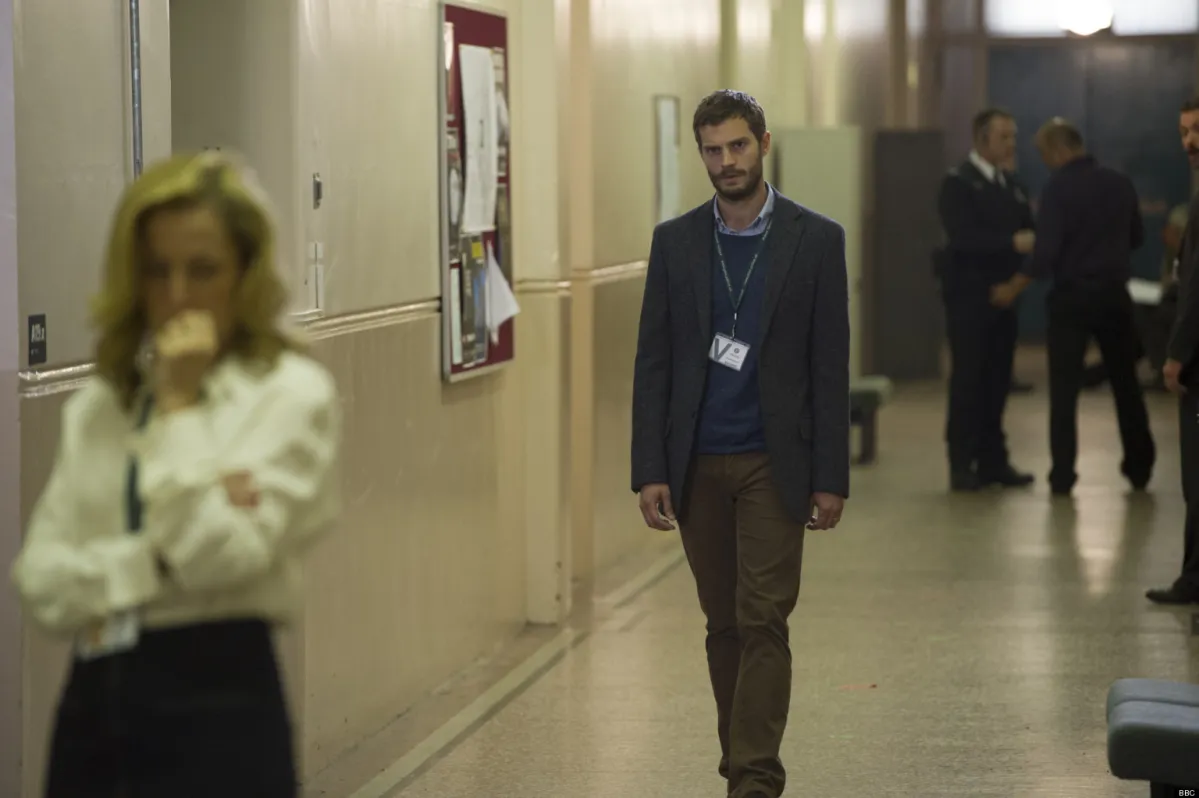On November 16, Observer columnist Rachel Cooke took the second series of BBC’s The Fall to task over her belief that the show was little more than a fetishization of violence against women. She noted the camera tends to linger for too long on star Gillian Anderson’s body in scenes where the show’s central figure (a hard-nosed female detective in a very male-dominated sphere) is just, say, having a shower or catching a work nap. And that the lead villain, played by Jamie Dornan, is a little too handsome, charming and good with children — leaving the show’s audience confused. How can they hate him, even when he’s brutally strangling women? Her argument is that critics overlook the show’s sexist overtones because it has great writing, acting and cinematography — but that, ultimately, the show is a celebration of the exploitation, rape and murder of women.
Allow me to disagree.
The show is absolutely attempting a 50 Shades of Grey aspect with Dornan’s character, Paul Spector, which could be misconstrued as condoning or glorifying his actions. After all, when he’s not stalking and murdering women, he does seem like a fairly nice guy. He’s a loving father and husband, works as a bereavement counselor, and even (confusingly) defends a woman whose husband appears to be abusing her. But it’s a mistake to argue that we’re meant to like him because of this, or excuse his murders because — gosh darnit — he sure is good with his kids. Instead, it seems all the more sinister that he can carry on a normal life while harboring his abhorrent compulsion. Rather than excusing his behavior, I feel that the show forces us to wonder how many seemingly normal people walk around with dark secrets. And Dornan’s attractiveness feeds into that — how could this guy (played by a former underwear model) really be evil?
As for the focus on Gillian Anderson’s sexuality, the show presents us with a much more complicated set of circumstances than Cooke gives it credit for. In the first season, Anderson’s character, Stella Gibson, sleeps with a police officer that she picks up at a crime scene, and it’s only after that officer is killed in the line of duty that she discovers he’s married with children. Gibson, who hardly knew his name, let alone the fact that he was married, is then censured and questioned by her boss about the inappropriate relationship and blamed for the distress that her one night stand has caused his already grieving wife. In something of a soap opera moment, she reminds said boss that he too slept with her while he was married — and wonders, to the audience more than to him, why it seems like she is forced to shoulder the responsibility for men’s infidelity. The second season continues that storyline, in which Gibson is publicly outed as a home-wrecker in the press and is forced to dress primly and lie low to avoid further embarrassment. Is this a simple exploitation of a female character, or is it a nuanced and progressive look at the way we still view women and sexuality?
Meanwhile, most of the killer’s victims are women that he finds in bars or on dating websites — women who all fit particular aesthetic (dark hair, pale skin, big eyes), but particularly those he seems to view as “fallen” or ruined. And indeed, the focus of the murder and the rituals he performs afterwards seem to be an attempt to purify his victims in death. It’s a pattern that Anderson’s character recognizes. In order to make sure that the media continues to view the victims as victims — rather than women who were “asking for it” — she asks that the other officers working the case not release information about the women’s sex lives to the press.
This is perhaps the show’s central theme: women comfortable with their sexuality are demonized even while men are committing far more egregious (and literal) crimes. The show asks us to question why a single woman sleeping with a man she doesn’t know is somehow on par with murder.
These are not moments that a misogynist show would delve into — and it’s at this point where I wonder if Cooke is mistaking the show’s exploration of sexism for sexism in and of itself. Because that is the real purpose of the show, from my perspective — it is an examination of the way we view certain victims as less innocent than others. That we are often willing to excuse the behavior of attractive or seemingly nice men, but we won’t extend that courtesy to attractive or seemingly nice women — particularly if they enjoy sex. To dismiss these moments of real introspection and investigation into our attitudes about women because Jamie Dornan’s got a nice ass or because Gillian Anderson wears a silk nightie is to misunderstand the show entirely.
So no, The Fall is not misogynist. But I dare say that Cooke’s article may have been.
Sarah Arboleda lives with a human and two cats in British Columbia, Canada and writes for a number of blogs including her own — the pop culture-based Tea Leaves and Dog Ears. If you’d like to yell at her, feel free to do so over Twitter.
Are you following The Mary Sue on Twitter, Facebook, Tumblr, Pinterest, & Google +?









Published: Nov 28, 2014 08:00 pm